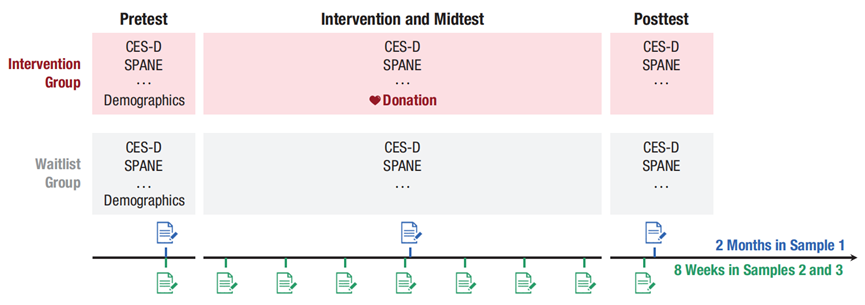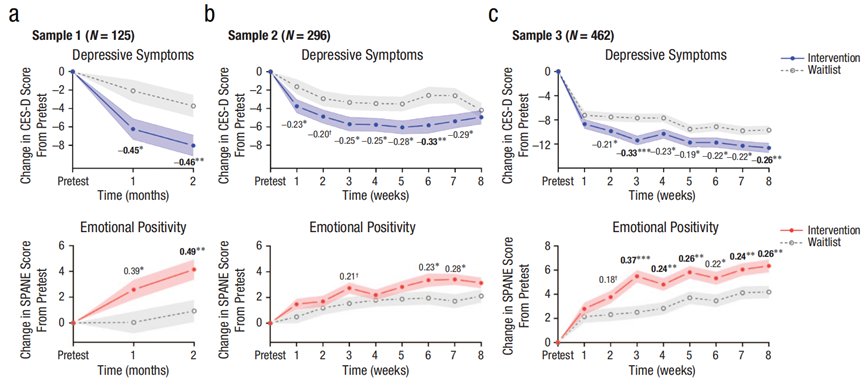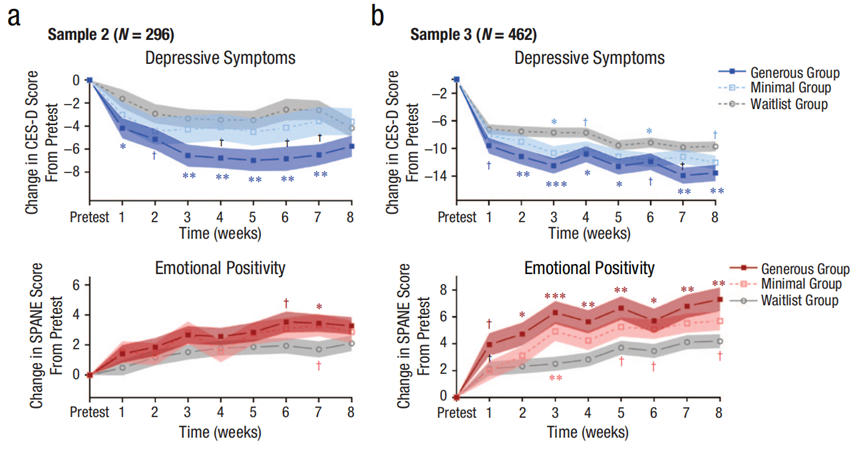Recently, Professor Jinting Liu’s research group from the School of Psychology, Shenzhen University, published a paper in Psychological Science titled “Can One Donation a Day Keep Depression Away? Three Randomized Controlled Trials of an Online Micro-Charitable Giving Intervention.”
This study developed an online micro-charitable giving intervention and tested its effectiveness in alleviating depressive symptoms among individuals with depression. The first author, Yuyang Zhang, and the second author, Qianyu Jiang, are master’s graduates of our School, while the third author, Yushen Luo, is an undergraduate student. Professor Jinting Liu served as the corresponding author. Shenzhen University is both the first-affiliated institution and the corresponding author’s institution.
1. Research Introduction
Depression is an affective disorder characterized primarily by persistent low mood and anhedonia. Although many treatment methods are available and have been proven effective in alleviating depressive symptoms, the high financial cost of treatment remains a major reason why many individuals with depression do not seek help. This highlights the urgent need for low-cost interventions to mitigate depressive symptoms.
Previous research has shown that spending even a small amount of money on others (for example, one dollar) can enhance personal well-being. This raises a critical question: could spending even less—for instance, just one cent per day—improve individuals’ mood and reduce their depressive symptoms? To address this, the present study developed an online micro-charitable giving intervention and tested whether donating one cent online each day could alleviate depressive symptoms among individuals with depression.
2. Research Background
Prosocial behavior has long been considered a protective factor against depression. However, meta-analyses show that prosocial interventions—primarily those involving engaging in and recording prosocial activities—have not been very effective in reducing depressive symptoms. One possible explanation is that prosocial behavior often requires social interaction, which individuals with depression may find difficult to engage in.
Online charitable giving, as a form of prosocial behavior, offers a unique advantage: it allows individuals to engage in prosocial acts without direct social interaction. The positive effects of prosocial behavior on mental health can be achieved not only through improved social relationships but also through enhanced positive emotions. According to the warm glow model, people derive happiness from giving, and this happiness, in turn, motivates further giving. Thus, while online charitable giving may not operate through direct social interaction, it may improve depressive symptoms by boosting positive affect.
Based on this rationale, the study developed an online charitable giving intervention. Considering cost-effectiveness, the donation amount was set at the minimum unit—one cent. To examine the intervention’s effectiveness in reducing depressive symptoms and the mediating role of positive emotions, the researchers conducted three pre-registered randomized controlled trials (RCTs).
3. Research Methods
Across the three samples of individuals with depression, the study implemented a two-month intervention (see Fig. 1 for the experimental procedure). Participants were randomly assigned to either the intervention group or the waitlist control group.
Participants in the intervention group were invited to donate one cent each day through the Tencent Charity platform, choosing freely from projects they wished to support. Each evening between 7:00 and 9:00 p.m., they received a reminder message: “If you have made your donation today, please remember to complete the project record. Every contribution counts—one cent is also an act of love.”
Participants in the waitlist control group did not receive any intervention during this period; they were provided with the intervention materials only after the intervention group had completed the two-month program. To further explore whether the amount donated influenced intervention effectiveness, in the latter two samples the researchers also collected participants’ daily donation amounts.

Figure 1. Experimental procedure. CES-D = Center for Epidemiologic Studies Depression Scale; SPANE = Scale of Positive and Negative Experience. Sample 1 was measured monthly, while Samples 2 and 3 were measured weekly.
4. Research Results
Across all three samples (Fig. 2), the intervention consistently enhanced positive affect among individuals with depression (Cohen’s ds ranging from 0.20 to 0.49) and alleviated their depressive symptoms (Cohen’s ds ranging from –0.19 to –0.46). Moreover, mediation analyses revealed that positive affect served as a mediator of the intervention’s effects on reducing depressive symptoms (Fig. 3).
In addition, in Samples 2 and 3, the intervention group was further divided into a minimum-donation group (average daily donation equal to one cent) and a generous-donation group (average daily donation greater than one cent). Results indicated a trend that participants in the generous-donation group benefited more from the intervention (Fig. 4).

Figure 2. In Sample 1 (a), Sample 2 (b), and Sample 3 (c), participants in the intervention group showed greater improvements in depressive symptoms and positive affect than those in the waitlist control group.

Figure 3. Mediation effect of positive affect in the relationship between the intervention and the reduction of depressive symptoms.

Figure 4. Potential moderating effect of donation amount on the intervention outcomes.
5. Conclusion
This study developed an online micro-charitable giving intervention that does not rely on direct social interaction, and demonstrated that it can alleviate depressive symptoms by enhancing positive affect among individuals with depression.Theoretically, the findings show that prosocial behavior can exert mental health benefits not only through the pathway of social relationships but also directly via increased positive emotions, providing empirical support for the warm glow model.
Practically, the online micro-donation intervention offers the advantages of high accessibility and low cost, making it a promising option for large-scale prevention and alleviation of depression in the field of public health. In today’s society, a single cent may appear to have little monetary value, yet this study revealed that one cent, when given to others, can still promote psychological well-being. As the study’s guiding message emphasized: “Every contribution counts—one cent is also an act of love.”
This research has also attracted attention from psychology media outlets such as PsyPost and the Greater Good Science Center, highlighting its theoretical significance and potential societal impact.